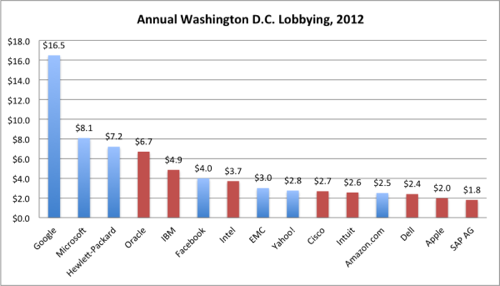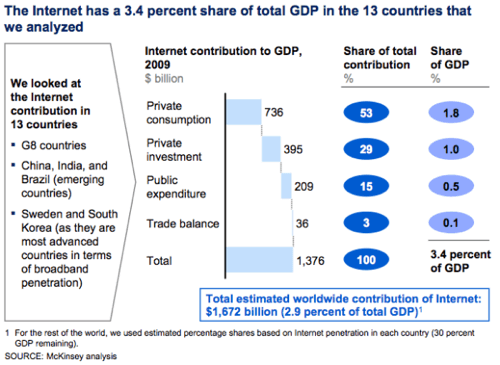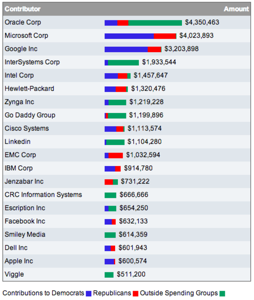
When you’re looking for a job, success often comes down to who you know. And if you’re a company hoping to make government work for you, success may come down to who you pay. Even as the total sum spent on lobbying has declined for the second year in a row, tech vendors – with Google leading by a wide margin – have poured more money into D.C. pockets, largely to fend off government meddling in technology markets.
Good luck with that.
For decades the technology industry largely ignored Washington, D.C., believing itself immune from Federal lawmakers’ meddling. At the same time, government mostly ignored technology. United States vs. Microsoft served as a wake-up call to both, however, and ever since the tech industry lobby has grown, even as overall lobbying by other industries has declined, as recent data from OpenSecrets.org highlights.
The biggest spender of all? Google, which more than doubled the donations of second-place Microsoft:

Spending in millions.
Why was Google such a big spender in 2012? Two reasons: the Stop Online Piracy Act (SOPA) and the Protect Intellectual Property Act (PIPA). Both bills were big news in 2012, and Google lobbied hard against them.
Indeed, more money has been coming from the Internet firms – Facebook’s contributions are up 200% year-over-year – as they seek to carve out breathing room from federal regulators. This makes sense in light of technology’s, and particularly the web’s, rising impact on GDP, as McKinsey has found:

Old-school technology vendors have had less need to buy a seat at the federal table, and have mostly trimmed their lobbying outlays. When it comes to direct donations to political candidates, however, the legacy technology vendors outpace their Internet peers:

What’s most interesting in all this is the sides the different technology companies are taking. As Greylock partner and former Mozilla CEO John Lilly argued in the wake of SOPA, we’re seeing the technology industry take positions along generational lines:
Existing industries are always oriented towards self-preservation….[T]here’s a funny thing that happens: the most progressive companies of today who become successful and dominant will become reactionary in the future, oriented themselves towards self-preservation….[Y]ou can see it even in the current situation – the companies who are most outspoken are the modern Internet companies: LinkedIn, Mozilla, Zynga, Google, etc etc. Mostly on the sidelines are the most progressive technology companies of the past decades, even including Apple. So this is not, fundamentally, a techie v content type of issue at all, but more of a progressive v conservative technology issue.
Over time, we should expect to see technology vendors spend more on buying government influence, as technology’s impact on the economy deepens. There’s simply no way that government will take a hands-off approach to such a critical influence on GDP.
The most fascinating aspect of this spending, as Lilly intimates, will be which technology vendors support which causes. Today Google is lobbying hard to defend Internet freedom and its business model. Tomorrow it may simply be fighting to defend its business model.
Same as it ever was.
Image courtesy of Shutterstock

















